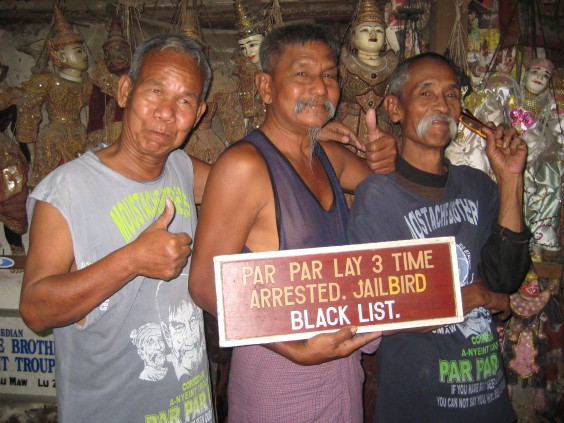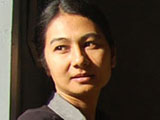Par Par Lay: The Power of Laughter
After his comedy troupe was banned from public performances, a Burmese comedian launches a campaign to end political fear.

The Moustache Brothers (Lu Zaw, Par Par Lay, and Lu Maw) refuse to stop performing despite political persecution. Photo: Wikimedia Commons
The Burmese comedian Par Par Lay comes from a performing family: His grandfather, father, younger brother, and cousins are all comedians—plus, all of their spouses are dancers. Additionally, Par Par Lay, his brother Lu Maw, and his cousin Lu Zaw founded the Moustache Brothers, a popular traditional Burmese a-nyeint (screwball comedy and classic Burmese dance) group.

- In Burma if you want to hear about issues the newspapers can’t talk about, you should go to a tea shop. Tea houses were where I used to meet with other activists, writers and artists, as well as where I built friendships. Within tea houses we talked about Burmese writers, literary trends we noticed, and, of course, politics. This online space attempts to emulate the conversations I enjoyed in Rangoon’s tea houses.

- Khet Mar is a journalist, novelist, short story writer, poet, and essayist from Burma. She is the author of one novel, Wild Snowy Night, as well as several collections of short stories, essays and poems. Her work has been translated into English and Japanese, been broadcast on radio, and made into a film. She is a former writer-in-residence at City of Asylum/Pittsburgh.
But while jokes have the power to make us laugh, they can also shed light on serious political issues. Par Par Lay is just one example of the many people who have been arrested in Burma for expressing what they believe in.
In 1990, Par Par Lay was detained for six months after he campaigned for Aung San Suu Kyi’s National League for Democracy party. In 1996, he and Lu Zaw were arrested and sentenced to seven years in prison for joking about the military regime at an Independence Day celebration at Aung San Suu Kyi’s home. They were sent to a hard-labour camp in the Kachin state and released in 2001.
As an additional consequence, the Moustache Brothers were banned from performing in public. Nevertheless, Lu Maw decided to perform for tourists at his home, but the family struggled to support itself, and its two imprisoned Brothers, with the income from those private shows.
Before the ban I had the chance to watch the Moustache Brothers perform in 1996 and was able to talk with them for hours after the show. That experience is how I first became interested in this family of performers, but unfortunately I never had the chance to see them again. However, after I moved to the United States in 2009, I often called them to talk.
On one occasion Par Par Lay told me that nowadays the audience asks him about the changes that have occurred in Burma’s government since President Thein Sein assumed power in 2010:
“When people ask if Burma is on its way to democracy,” he said, “I reply that I can’t say if Burma is on its way or not, but I’m sure that I’m not on my way to democracy yet. I was in jail because I expressed my beliefs. Then, when I was released in 2001, the authorities told me that I wasn’t permitted to perform in public. Since I still can’t legally perform with my troupe, or any other groups, that is my answer to the audience.”
But aside from the ban being an annoyance for Par Par Lay, he doesn’t look as if he’s affected by it. He is doing what he can when he can’t do what he wants. Last year, he launched the No Fear campaign, which aims to raise awareness about the current political situation in middle Burma.
“Most people are still afraid to speak out, and they don’t know their rights,” he said. “So I tell them to select the leader they want with no fear in the 2015 election.”
Despite the persecution he’s faced, it’s clear how much Par Par Lay loves being a comedian when he says: “If I return as a human in the next life, I just want to be a comedian again. A comedian’s job is to make people happy. If he sees that people are happy, he is happy as well. Plus, a comedian can educate people and serve as a representative for their suffering.”
Still, instead of wishing for things in the next life, I’d rather work in this life toward a Burma where Par Par Lay is free to use his comedy to make people happy again.





One Comment on "Par Par Lay: The Power of Laughter"
Dear Khet Mar,
A Burmese friend in Canada (you met him this last holiday at Thin Thin Aye’s house) would like to be put on the subscribers list. I will send it later. I really enjoy reading this.
Sue